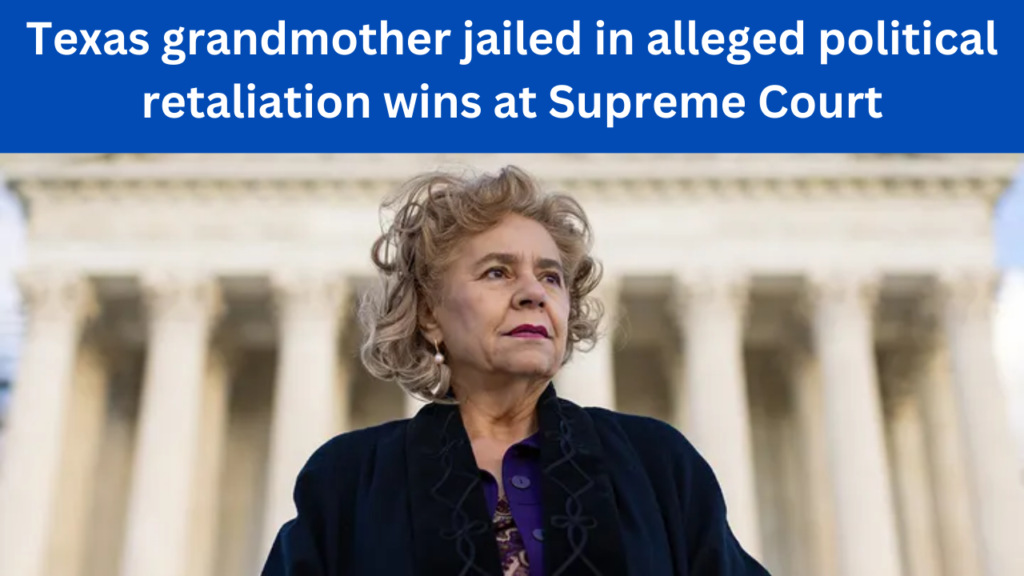Texas Grandmother Jailed : In a landmark decision that has captured the nation’s attention, the U.S. Supreme Court recently ruled in favor of a Texas grandmother who claimed she was jailed in retaliation for her political activism. This case, marked by its significant implications for political free speech and legal protections, underscores the intersection of individual rights and governmental authority. “Texas Grandmother Jailed ” This article will delve into the details of the case, examine its broader impact, and answer frequently asked questions about the ruling.
Table of Contents
The Case Overview
Background
The case centers around a Texas grandmother, Patricia Miller, who found herself at the heart of a contentious legal battle after being jailed under circumstances she contended were politically motivated. Miller, a vocal “Texas Grandmother Jailed ” activist and community leader, was arrested in 2022 following a series of public demonstrations and outspoken criticism against local government policies. Her arrest sparked allegations that it was a retaliatory action in response to her political dissent.
The Allegations
Miller’s legal team argued that her arrest was not based on legitimate charges but was instead a punitive measure aimed at silencing her political voice. They claimed that the timing and circumstances of her arrest, coupled with “Texas Grandmother Jailed ” a lack of concrete evidence, indicated that the arrest was a strategic move by local officials to suppress dissent and intimidate activists.
Also Read : Tracy Camilla Johns Net Worth: An In-Depth Look at the Actress’s Financial Success
Legal Proceedings
The case initially made its way through lower courts, where the claims of political retaliation were met with mixed responses. The local court system grappled with the complexities of distinguishing between lawful law enforcement actions and potential abuses of power. Miller’s legal team, however, persisted in their pursuit of justice, arguing that her constitutional rights had been infringed upon.
Supreme Court Ruling
Decision Summary
In a decisive ruling, the Supreme Court sided with Patricia Miller, concluding that there was sufficient evidence to support her claim of political retaliation. The Court’s decision was grounded in the First Amendment rights, which protect individuals from retaliation by government officials for engaging in free “Texas Grandmother Jailed ” speech and political activities.
Key Points from the Ruling
- Violation of First Amendment Rights: The Supreme Court found that Miller’s arrest constituted a violation of her First Amendment rights. The Court emphasized that political retaliation by government officials undermines the core democratic principle of free expression.
- Evidence of Retaliation: The ruling highlighted the importance of evidence linking governmental actions to political motives. The Court found that the pattern of Miller’s arrest, combined with the timing and context, supported her claims of retaliatory intent.
- Precedent and Implications: The decision set a significant precedent by reinforcing the protection of political dissent and activism against governmental overreach. It underscored the judiciary’s role in safeguarding individual rights from potential abuses of power.
Reactions to the Ruling
The Supreme Court’s decision was met with a range of reactions from various quarters. Civil liberties advocates and political activists hailed the ruling as a victory for free speech and a crucial step in holding government officials accountable. “Texas Grandmother Jailed ” Conversely, some criticized the decision as potentially encouraging frivolous claims and complicating law enforcement efforts.
Broader Implications
Impact on Free Speech and Political Activism
The ruling has profound implications for the realm of free speech and political activism. By affirming that political retaliation is a serious infringement on constitutional rights, the Supreme Court has reinforced the principle that individuals should be free to express dissent without fear of retribution.
- Strengthened Protections: The decision strengthens legal protections for individuals engaged in political activism, ensuring that their right to free speech is upheld even in the face of potential governmental pushback.
- Encouragement for Activists: The ruling may encourage more individuals to engage in political activism, knowing that they are protected against retaliatory actions from governmental authorities.
Legal and Political Repercussions
The ruling also has broader legal and political repercussions:
- Government Accountability: The decision emphasizes the need for government officials to act within the bounds of the law and refrain from retaliatory measures against political dissenters.
- Legal Precedents: The case sets a significant legal precedent, influencing how future claims of political retaliation will be assessed and adjudicated.
FAQs : Texas Grandmother Jailed
What was the main issue in Patricia Miller’s case?
The main issue in Patricia Miller’s case was whether her arrest was a retaliatory action taken by government officials in response to her political activism and free speech. Her legal team argued that her arrest was politically motivated and thus a violation of her constitutional rights.
What did the Supreme Court decide?
The Supreme Court ruled in favor of Patricia Miller, concluding that her arrest was indeed retaliatory and constituted a violation of her First Amendment rights. The Court’s decision highlighted the importance of protecting political dissent and free expression from governmental overreach.
How did the Supreme Court justify its decision?
The Supreme Court justified its decision by finding evidence that Miller’s arrest was linked to her political activities and criticism of local government policies. The Court emphasized that political retaliation undermines the principle of free speech and is impermissible under the Constitution.
What are the broader implications of this ruling?
The ruling has significant implications for free speech and political activism. It reinforces protections for individuals engaged in political dissent and sets a precedent for addressing claims of political retaliation. The decision also highlights the need for accountability among government officials and the judiciary’s role in safeguarding individual rights.
How might this decision affect future cases?
This decision is likely to influence future cases involving claims of political retaliation and free speech. It sets a legal precedent for how such claims will be assessed and adjudicated, potentially affecting the strategies used by both activists and government officials in similar cases.
Are there any criticisms of the Supreme Court’s ruling?
Yes, some critics argue that the ruling might lead to an increase in frivolous claims or complicate law enforcement efforts. There are concerns that the decision could create challenges in distinguishing between legitimate law enforcement actions and retaliatory measures.
What should individuals know about their rights in light of this ruling?
Individuals should be aware that they have the right to engage in political activism and free speech without fear of retaliation from government officials. This ruling reinforces the legal protections available to individuals who believe their rights have been infringed upon due to their political activities.
Conclusion :Texas Grandmother Jailed
The Supreme Court’s ruling in the case of Patricia Miller represents a landmark moment in the protection of free speech and political activism. By affirming the importance of safeguarding individuals from political retaliation, the Court has reinforced fundamental constitutional rights and set a significant precedent for future cases.
The ruling underscores the judiciary’s crucial role in maintaining the balance between governmental authority and individual freedoms. As political activism and dissent continue to play a vital role in democratic societies, this decision serves as a reminder of the importance of protecting these rights and ensuring that they remain inviolate in the face of potential abuses of power.
With its far-reaching implications for free speech and government accountability, the case of Patricia Miller will undoubtedly be a reference point in legal and political discussions for years to come. As we move forward, it is essential for individuals and officials alike to understand and respect the boundaries set by this landmark decision, ensuring that the principles of free expression and political dissent continue to be upheld.



